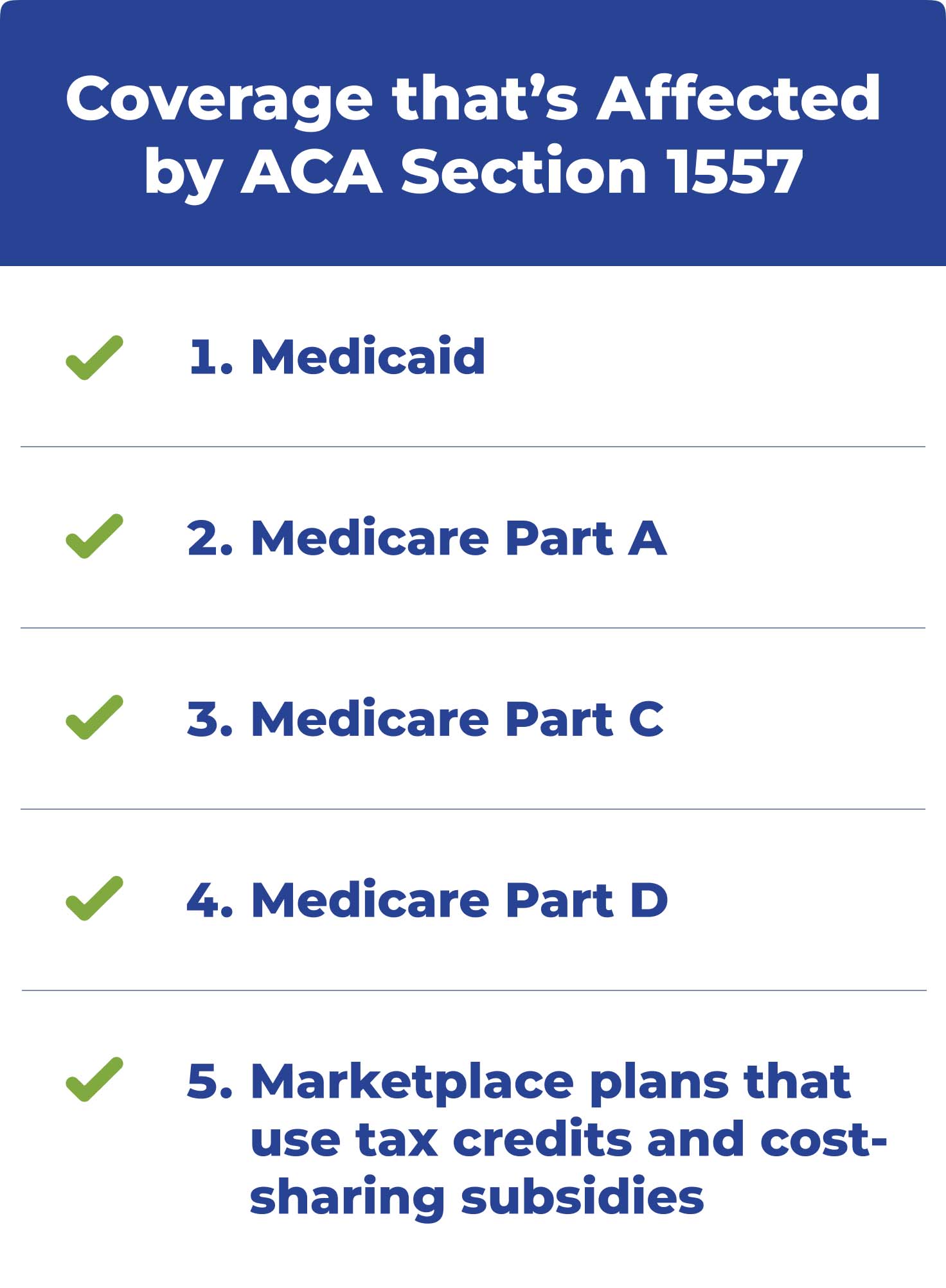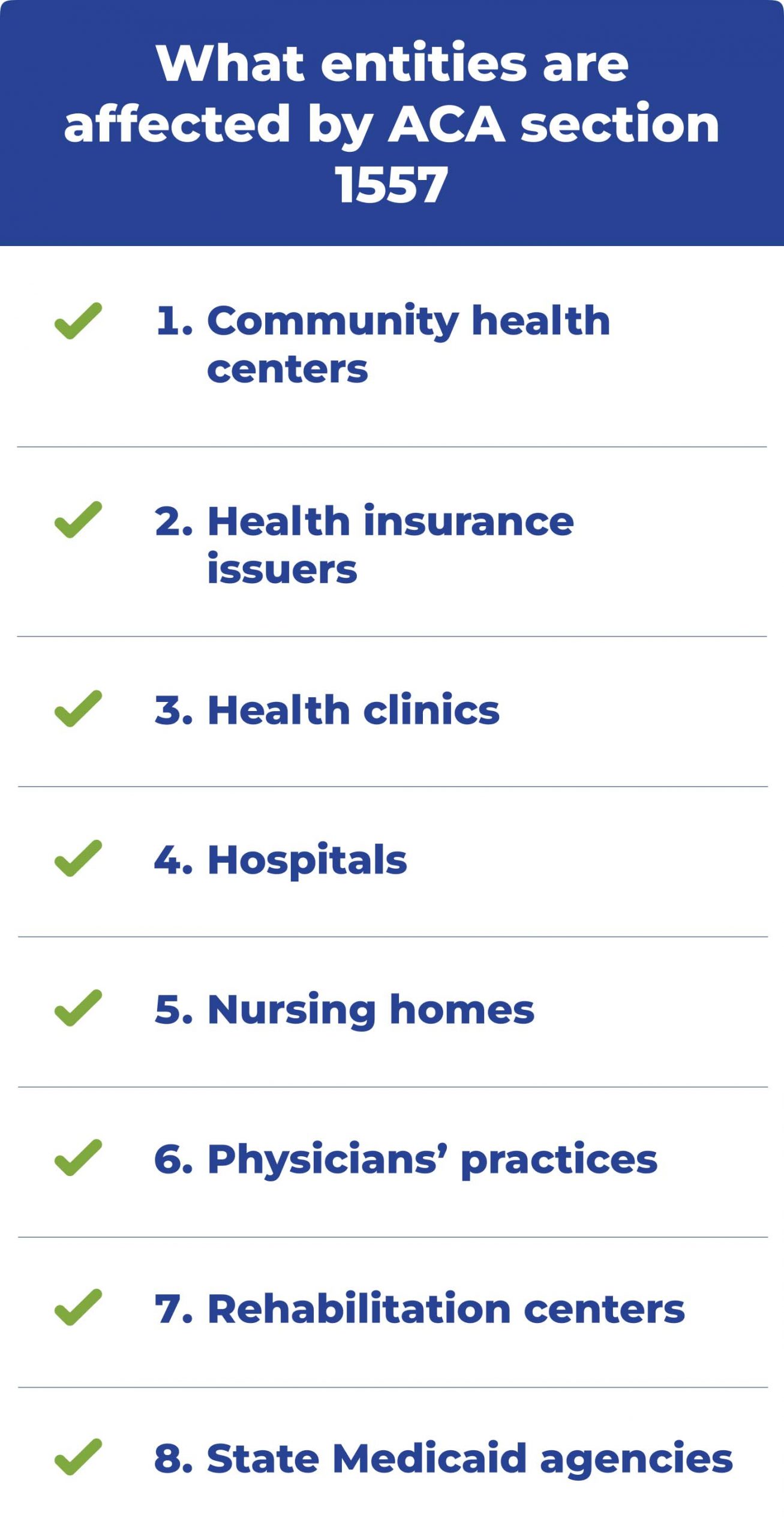 Which Medicare Programs are Covered by ACA Section 1557" width="2400" height="1256" />
Which Medicare Programs are Covered by ACA Section 1557" width="2400" height="1256" /> Which Medicare Programs are Covered by ACA Section 1557" width="2400" height="1256" />
Which Medicare Programs are Covered by ACA Section 1557" width="2400" height="1256" />
Racial disparity is a concern when it comes to affordable and quality healthcare. The Affordable Care Act (ACA) aimed to close this gap and ensure nondiscrimination protections for everyone regardless of race, age, disability, color, natural origin, or sex.
The final rule posted by the U.S. Department of Health and Human Services (HHS) Office for Civil Rights (OCR) finalized these protections in 2020.
Below we’ll discuss the implications of ACA Section 1557, the Final Rule of 2020, and the changes. Then, we’ll answer a few frequently asked questions and explain how to get help with Medicare plan options regardless of your situation.
Section 1557 doesn’t allow health programs and activities that receive federal funds to discriminate based on the abovementioned disparities.
It’s also the first federal civil rights law to prohibit discrimination of sex for health-related services and procedures. The final rule eliminated some of the broad characteristics of the law and made it more specific.
The previous rule from 2016 had a broader scope and included provisions about sex stereotypes and gender identity. The differences between the 2016 and the 2020 final rule are as follows.

The ACA Section 1557 applies to only health insurance issuers and coverages that receive federal funding. Federal funding includes grants, property, and payments towards premiums of affected Insurance coverage options. Insurances that are affected include:
Medicare Part B is not affected by the nondiscrimination requirements of the final rule presented by HHS in 2020. Likewise, most group health plans don’t receive federal financial assistance. Therefore, they’re not affected by ACA Section 1557.

The ACA Section 1557 doesn’t only apply to insurance but also to other facilities and organizations that are recipients of federal financial assistance, such as:
ACA Section 1557 created several new regulations implemented on affected entities. These organizations, facilities, and companies must meet the additional requirements below.
These requirements were changed when the ACA adopted the 2020 final rule. As of 2020, Entities with more than 15 individuals no longer must appoint a compliance coordinator or produce a grievance procedure.
They’re no longer required to provide notice of nondiscrimination policies in significant communications such as employee handbooks and publications for outreach, physical locations, and website homepages.
The final rule removed this requirement because these regulations are already in place from the following laws.
Affected entities must provide individuals with limited English proficiencies with clear notices, translation, and language assistance services and take appropriate steps to supply language access and translation services to people with limited English proficiency. These protections are required to prevent discrimination based on national origin.
Civil rights protections have been a hot button for years, and specific laws and regulations have tried to combat discrimination.
While Title vi provides some longstanding protection, ACA Section 1557 adds additional protections for racial discrimination against race, color, and national origin in the healthcare industry.
ACA Section 1557 is unique from other civil rights laws as it is the first to add discrimination protections based on gender. These protections prohibit affected healthcare organizations from the following.
Before the ACA Section 1557 took effect, health plans could provide certain services for men but deny them to women.
Another form of discrimination that could have taken place would be placing specific medications to treat particular illnesses on the highest cost tier or limiting the age on practices confirmed to be appropriate for all ages.
The 2020 final rule also amended the original ACA regulations that required all entities to provide coverage for abortions.
The previous rule didn’t give any rights to religious exemptions. The final rule reincorporation the religious exemptions for specific procedures.
This change made it no longer sex discrimination if it involved paying for an abortion or would be inconsistent with the organization’s religious beliefs.
ACA Section 1557 affects all health plans that receive federal funding. This funding can be in premium payments, grants, property, tax credits, and cost-sharing subsidies.
Affected insurances include Medicare Part A, Medicare Advantage plans, Medicare Part D prescription drug plans, Medicaid plans, and Marketplace plans.
It assures that healthcare providers are not biased towards individuals in the community, have access to healthcare insurance, and make it affordable for the residents.
Affected entities must be impartial about individuals with diverse ethnic backgrounds, races, gender, religion, physical appearances, and individuals with disabilities.
ACA Section 1557 also ensures all individuals have equal policies and procedures, physical access, and communication.
Not all Medicare programs are affected by Section 1557, such as Medicare Part B and Medicare Supplement insurance. They aren’t affected because they don’t access or receive federal funds.
ACA Section 1557 affects the following parts of Medicare:
It applies to insurance companies, facilities, and health organizations accepting federal funding. Federal funding includes grants, premium payments, property, subsidy cost-share, and tax credits.
The ACA Section 1557 aims to curb discrimination in healthcare based on race or the basis of sex. This section keeps healthcare entities from offering different services, prices, procedures, or coverages based on sex or race. It also protects from increasing costs or creating limitations for specific health conditions or diseases.
The final rule removed the protections for gender identity. It ruled that it applied to gender at birth—title Vii of the Civil Rights Act of 1964 established protections for gender identity and sexual orientation.
The 2020 ACA Section 1557 final rule outlaws prejudice founded based on race, color, national origin, sex, age, and disability in any health programs or connected entities that receive federal funds.
The final rule for ACA Section 1557 removes protections for gender identity and shifts them to gender at birth. The US Supreme Court upheld a Georgia gender identity and sexual orientation decision. This case’s protections were under Title Vii of the Civil Rights Act of 1964. Since these protections were already in place, there wasn’t a need to revisit the final rule.
No matter your situation, we’ll help you find the best supplemental Medicare health benefits for your needs. Our licensed insurance agents will help access your situation and needs, review your doctor’s and prescription, and present you with plan choices catered to your needs.
Call us at the number above or fill out our online request form. Our agents are here to help you with every step of the process, from comparison to enrollment.
Related Content
Lindsay Malzone, Lindsay Malzone is the Medicare editor for Medigap.com. She's been contributing to many well-known publications since 2017. Her passion is educating Medicare beneficiaries on all their supplemental Medicare options so they can make an informed decision on their healthcare coverage.
Reviewed By:Rodolfo Marrero, Rodolfo Marrero is one of the co-founders at Medigap.com. He has been helping consumers find the right coverage since the site was founded in 2013. Rodolfo is a licensed insurance agent that works hand-in-hand with the team to ensure the accuracy of the content.
Get a FreeA+ Rating More than 3 million customers served since 2013.

medigap.com is privately owned and operated by Excel Impact, LLC. Invitations for applications for insurance on medigap.com are made through Flex Rates, LLC, a subsidiary of Excel Impact, only where licensed and appointed. Flex Rates licensing information can be found here. Submission of your information constitutes permission for a licensed insurance agent to contact you with additional information about the cost and coverage details of health plans. Descriptions are for informational purposes only and subject to change. Insurance plans may not be available in all states. For a complete description, please call (TTY Users: 711) to determine eligibility and to request a copy of the applicable policy. medigap.com is not affiliated with or endorsed by the United States government or the federal Medicare program. Medicare Supplement insurance plans are not connected with or endorsed by the U.S. government or the federal Medicare program. Not all plans offer all benefits. Availability of benefits and plans varies by carrier and location. Deductibles, copays and coinsurance may apply. Limitations and exclusions may apply. Participating sales agencies represent Medicare Advantage [HMO, PPO and PFFS] organizations and stand-alone PDP prescription drug plans that are contracted with Medicare. Enrollment depends on the plan’s contract renewal. We do not offer every plan available in your area. Currently we represent [73] organizations which offer [5110] products in your area. Please contact https://Medicare.gov , 1–800–MEDICARE, or your local State Health Insurance Program (SHIP) to get information on all of your options. The purpose of this communication is the solicitation of insurance. Contact will be made by a licensed insurance agent/producer or insurance company. Enrollment in a plan may be limited to certain times of the year unless you qualify for a special enrollment period or you are in your Medicare Initial Election Period. By using this site, you acknowledge that you have read and agree to the Terms of Service. and Privacy Policy.
We are committed to protect your privacy. If you do not want to share your information please click on Do Not Sell My Personal Information for more details.
Copyright © 2022 Medigap.com | All rights reserved | 382 NE 191st Street, Ste 57537, Miami, FL 33179.
United States
Copyright © 2022 Medigap.com. All rights reserved.